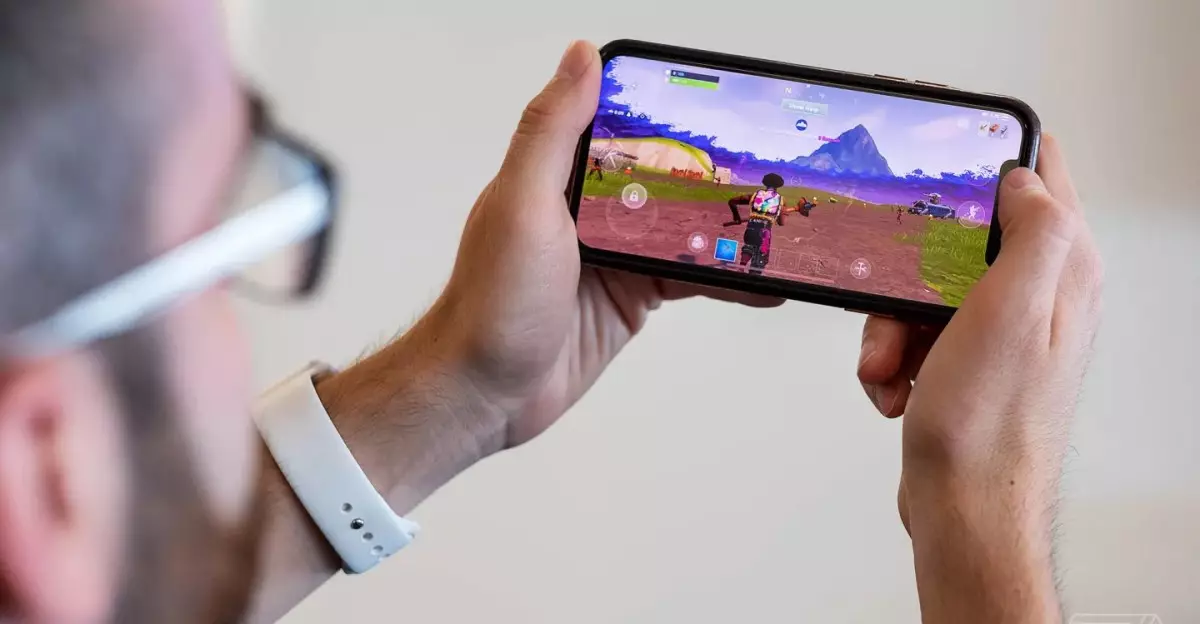In a momentous turn of events, Epic Games has successfully reintroduced its flagship title, Fortnite, to the iOS App Store nearly five years after its controversial removal. The game is making its comeback in the United States, and this return is not just about playing a popular battle royale on mobile; it symbolizes a significant shift in the ongoing power tussle between tech giants. The saga truly encapsulates a clash of ideologies: Apple’s rigid control versus Epic’s push for freedom in digital transactions.
The original removal stemmed from Epic’s decision to implement its own payment system within the game, thereby defying Apple’s established in-app purchase rules. This act of defiance ignited a lawsuit that has since evolved into a landmark case known as Epic Games v. Apple. The recent court ruling indicated that Apple must allow alternative payment methods, a ruling that set the stage for Fortnite’s joyous return. This is more than just a victory for Epic; it’s a watershed moment for any developer who has ever felt squeezed by the unyielding policies of major app stores.
The Legal Jacks and Queens
While the legal drama might have seemed far removed from the world of gaming, it fundamentally altered the landscape of mobile commerce. Epic CEO Tim Sweeney went from game developer to de facto advocate for fair market practices. His “peace proposal” offers an intriguing olive branch: he suggested that if Apple permits a global framework free from its infamous “Apple tax,” Epic would not only restore Fortnite to the App Store worldwide but would also drop ongoing litigation. This proposal carries weight, as it hints at potential negotiation pathways that could benefit the entire gaming industry.
The complexities of the legal world inserted themselves further when Epic’s submission faced delays due to compliance issues. Apple insisted that Epic submit the app without including the U.S. storefront so as not to impact Fortnite’s availability in other regions. This maneuver underscores the intricate tapestry of international digital markets, reminding developers that local compliance is just as critical as global strategy.
Revolutionizing the Gaming Experience
Fortnite’s re-entry into the iOS platform carries new features and incentives aimed to entice players back. Epic has rolled out a 20% reward for players who opt for Epic’s payment systems, a tactical move that not only elevates user engagement but also strategically undermines the traditional app store payment model. It’s a gamble, but a calculated one, showing that Epic is willing to challenge the status quo actively to enrich the player experience.
Moreover, the updated Fortnite app isn’t just a straightforward download; it comes with a clever twist. Players can initially download a smaller version, with the bulk of the game arriving afterward. For those looking to get right into the action, this could be a point of frustration, but it also reflects the evolving nature of game distribution that aligns with players’ increasing desire for immediate access—a hallmark of modern gaming culture.
A Broader Implication for the Gaming Ecosystem
The implications of Fortnite’s return extend beyond just a single game. This moment acts as a beacon for developers trapped under the thumb of app store regulations, suggesting that sustained legal action and community engagement can yield tangible results. It sends a message that the gaming community, alongside its developers, are more than just consumers; they are a force to be reckoned with in the tech realm.
The furious debate surrounding digital payment systems and app marketplace fairness will undoubtedly continue to resonate in the industry. The events that have unfolded over the years serve as a crucial lesson about corporate accountability, reminding tech giants that their market power comes with the responsibility to uphold fairness and competition.
In an era where gaming serves as both a leisure activity and a robust industry, the potential for change seems limitless—particularly when giants like Epic dare to challenge established norms. Will this spate of legal disputes reshape the app ecosystem for the better? Only time will tell, but for now, Fortnite’s re-launch feels emblematic of a future where the game developers can better negotiate their worth and ensure that the players remain at the center of their passion.

